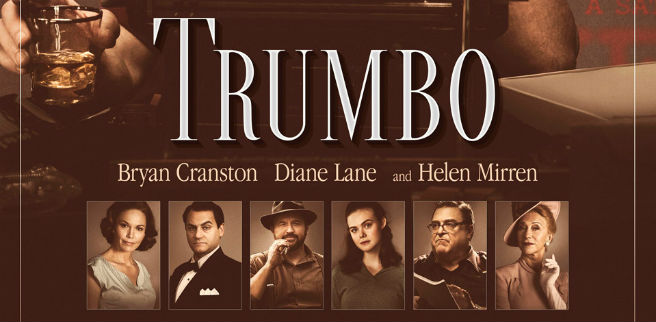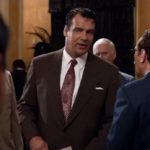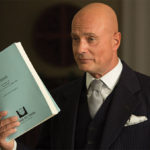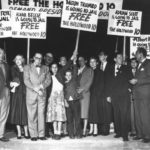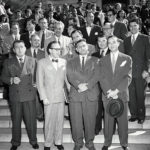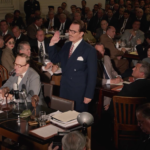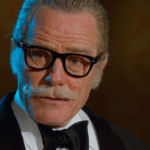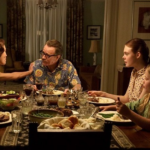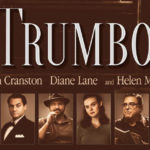What a turnaround for the career of Bryan Cranston! Before Breaking Bad he won awards for his TV work but mostly got supporting roles and cameos in movies, all of which he pulled off with aplomb. His turn in multiple series as Walter White, chemistry teacher diagnosed with cancer turned drug baron, shot Cranston into the Hollywood stratosphere and into leading roles such as the eponymous Dalton Trumbo.
This fills my heart with gladness since Cranston is primarily a character actor, neither young nor especially pretty but a craftsman, an artisan of his trade – the sort of actor we should be celebrating in preference to “stars.” Now he can afford to pick and choose his roles, Cranston can not only work with the best directors and costars in the biz, he can work on quality projects that justify investment.
Trumbo is unquestionably one such project, and the sort that at one time would not have been made, given its sympathetic portrayal of a screenwriter who defied the McCarthyite witch-hunts and an embargo on his work to become a wealthy and celebrated member of the Hollywood establishment – and, posthumously, to have his name restored as sole writer and Oscar-winner in respect of the scripts for Roman Holiday, The Brave One and, of course, Spartacus, the conflicts of which form a significant part of the narrative.
I doubt Hollywood or the US Congress looks back with any pride on their treatment of a man whose social conscience and support for workers’ rights, even in the Cold War where the Soviet Union was bogeyman and scapegoat for everything evil in the world.
This is ultimately a film about the injustices of the Hollywood blacklist, the principle plot line in this film. Along with many more, Trumbo was hounded by the House un-American Activities Committee and the Motion Picture Alliance for the Preservation of American Ideals (MPA), including long-time Trumbo adversaries such as John Wayne (David James Elliott), Ronald Reagan (referred to but not portrayed on screen) and showbiz columnist Hedda Hopper (Helen Mirren.)
However, such is the dramatic value and character study that while spotting famous names is fun (eg. John Wayne as mentioned above, Kirk Douglas played by Dean O’Gorman, Michael Stuhlbarg‘s Edward G Robinson, and a very entertaining Otto Preminger owned by Christian Berkel), you could almost forget the biopic genre. There Richard Portnow‘s Louis B Mayer) was much more to Mr Trumbo than being a pariah and victim of the injustices of the system, so it is greatly to the credit of writer John McNamara and director Jay Roach that they have created a very rounded portrait of a man, his work, his family life and the times in which he lived.
For example, how feverishly he worked around the clock, fuelled by amphetimines and bourbon; his towering ego, his paradoxes (such as being a wealthy communist), his cantankerous attitudes and difficult relationships with his children, notably Elle Fanning‘s Nikola, that his self-absorption caused – but also of his deep trust of loyal wife Cleo (Diane Lane.)
For that matter, his treatment of colleagues varied from the noble to the sarcastic and the cruel, contrasting with unpredictable fits of remorse and rage. Among the victims of Trump’s thoughtless behaviour is his loyal friend and colleague Arlen Hird (Louis CK), actually a composite character, as quoted in a fascinating article in Bustle:
The Hollywood 10 was a real thing, and the film’s portrayal of the 10 stays true to the facts — for the most part. This is a Hollywood movie, and adding nine more characters into a film makes it a little crowded. That’s why Trumbo decided to create the character of Arlen Hird, played by Louis C.K. He’s a composite of five real-life communist screenwriters who knew Trumbo between 1947-1970: Samuel Ornitz, Alvah Bessie, Albert Maltz, Lester Cole, and John Howard Lawson.
Hird’s death as a destitute blacklisted screenwriter is followed by a scene at the funeral where Hird’s son apologises to Trumbo for not being able to repay his debts. Trumbo replies that it is he who owes the debt. That makes me wonder what Trump’s real relationship with the five colleagues listed in the article were like.
It takes a rare actor to portray such a complex character coherently. Cranston is simply towering – he guides the narrative with an emotional eloquence requiring great skill to acquire and deliver. Ultimately, though, Trumbo succeeds as a film. by virtue of being a superbly written, filmed and performed movie, way beyond the leading man. In fact, I confidently predict that Trumbo himself would have approved of how is story was written and performed, and there could be no greater plaudit for the makers of a biopic.
On the down side, it may well be politically naive, such as where Trumbo defines communism as “sharing” to his young daughter. Trumbo’s views may well have been sincere but how hard-line his support of oppressive communist regimes is not recorded here, probably on the grounds that it would detract from the story of his principled stand as one of the Hollywood ten to refuse to name names. Even allowing for that, it’s a rattling good film.
The critical response, courtesy of Wikipedia, is listed below:
Trumbo has received generally positive reviews from critics. Rotten Tomatoes gives the film a rating of 75%, based on 163 reviews, with an average rating of 6.7/10. The site’s critical consensus states, “Trumbo serves as an honorable and well-acted tribute to a brilliant writer’s principled stand, even if it doesn’t quite achieve the greatness of its subject’s own classic screenplays.” Metacritic gives the film a score of 60 out of 100, based on reviews from 33 critics, indicating “mixed or average reviews”.
Peter Debruge of Variety gave the film a positive review, saying “Trumbo may be clumsy and overly simplistic at times, but it’s still an important reminder of how democracy can fail (that is, when a fervent majority turns on those with different and potentially threatening values), and the strength of character it takes to fight the system.” Lou Lumenick of the New York Post gave the film three and a half stars out of four, saying “It’s a cracking good story, and Cranston does a great job portraying a man who made great sacrifices for his principles.” Manohla Dargis of The New York Times gave the film a negative review, saying “Part biopic, part historical gloss, Trumbo tells a great-man story with a patchwork of fact and fiction, mixing in the odd bit of newsreel with a great many dull, visually flat and poorly lighted dramatic scenes.” Mick LaSalle of the San Francisco Chronicle gave the film three out of four stars, saying “Trumbo is breezy and pithy without ever undercutting the seriousness of the subject. A certain degree of wit is appropriate in a writer’s story, just as any Hollywood tale must at least have a whiff of absurdity, or else it can’t be true.” Richard Roeper of the Chicago Sun-Times gave the film three out of four stars, saying “Trumbo is a corny, well-made B-movie about an A-list screenwriter who had to take jobs writing B-movies after he was blacklisted, but eventually worked his way back to writing A-movies with Kirk Douglas a.k.a. Spartacus as his champion.”
Jordan Mintzer of The Hollywood Reporter gave the film a positive review, saying “What makes the movie work are the lively performances, both from the supporting cast and from Cranston, who sheds the mimicry and pontificating of earlier scenes to turn Trumbo into a wry, self-deprecating and somewhat cheeky older man, even if he continued to stand up for what was right.” Ty Burr of The Boston Globe gave the film three out of four stars, saying “Cranston’s performance is the motor that runs Trumbo, and that motor never idles, never flags in momentum or magnetism or idealistic scorn.” Alonso Duralde of TheWrap gave the film a positive review, saying “Roach and McNamara fall victim to the occasional phony biopic moment or straight-up moment of didacticism, but overall Trumbo is a lively history about the day-in-day-out drudgery of survival during oppressive times. Screenwriters are so rarely taken seriously by the film industry that it’s a nice switch to watch them be the heroes.” Bill Goodykoontz of The Arizona Republic gave the film three and a half stars out of four, saying “Roach’s film may be light in places, even sugarcoated in others, but any reminder of the past and its impact on the future is a welcome one. Plus, we get a good Cranston performance in the bargain.”
Despite generally positive reviews, several critics attacked the film for being historically misleading or for ideological reasons. Godfrey Cheshire of the Roger Ebert Journal wrote that Trumbo is “another of those simplistic, made-to-order films about the Hollywood blacklist in which the blacklisted movie folks are all innocent, in every conceivable way.” Cheshire decried the film’s insinuation that the House Committee on Un-American Activities created the Hollywood blacklist and that “Sen. Joseph McCarthy had something to do with Congress’ pursuit of Hollywood.” The film actually shows the blacklist being created by studio executives following a scene in which Louis B. Mayer is threatened by Hedda Hopper. McCarthy is shown in archival newsreel footage included before Trumbo’s release from jail in April 1951, discussing (according to the newsreel commentator) communists “infiltrating our government, our military, and our schools”, and is otherwise not mentioned in the film. Cheshire also wrote that the film defended international communism: “it invites us to the see the Communist Party USA as just another political party rather than as the domestic instrument of a hostile and ultra-murderous foreign tyranny.”
Other critics raised similar historical concerns. While the film portrays Trumbo as “a New Deal liberal hero defending civil liberties”, Ron Capshaw, in The American Spectator explained how the real Trumbo was an outspoken supporter of Soviet-style communism, including the brutal regimes of Joseph Stalin and North Korean dictator Kim Il-sung. The conservative Pat Buchanan questioned the appropriateness of portraying Trumbo as a “martyr to the first amendment” while overlooking his support for regimes that actively suppress free speech. Armond White of the National Review went a step further, accusing director Jay Roach of “unrestrained partisanship” for whitewashing the dark history of communist ideologies to invent a hero that supports Roach’s political views.

